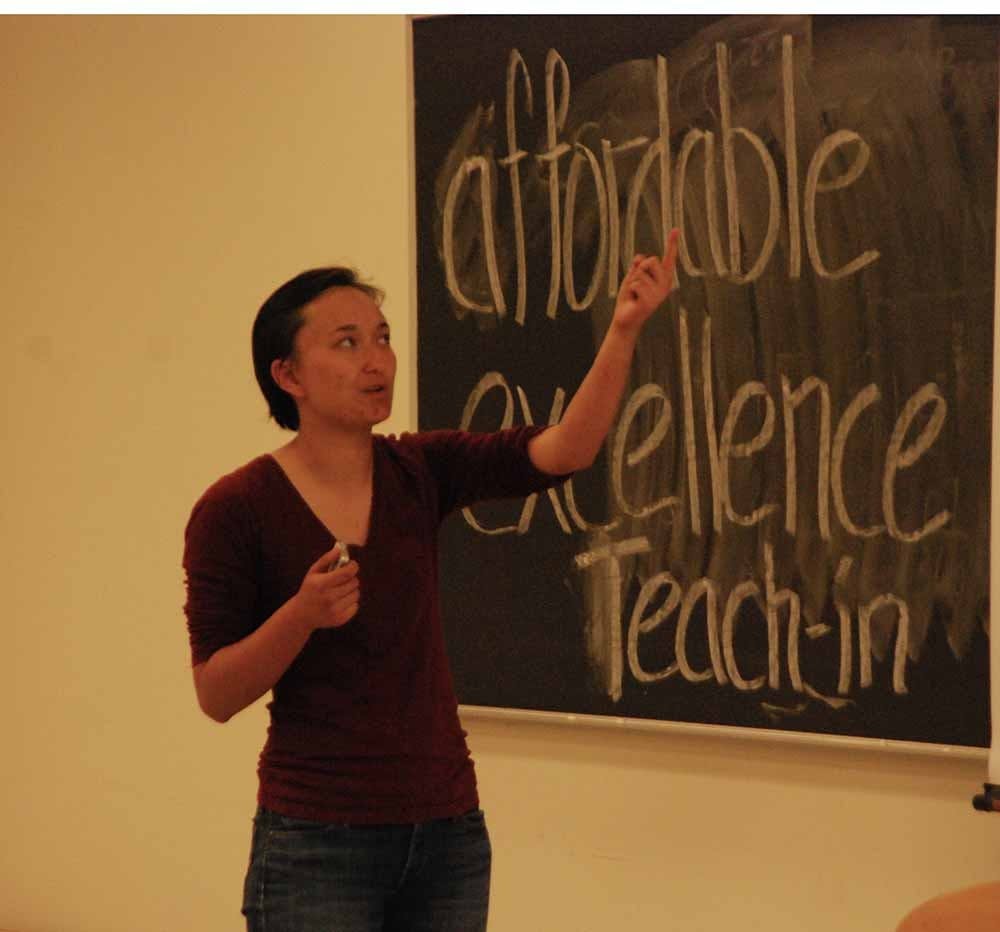U.Va. Students United and United for Undergraduate Socioeconomic Diversity co-hosted a teach-in Tuesday on the new Affordable Excellence model approved during the most recent Board of Visitors session.
Affordable Excellence is a multifaceted high tuition-high aid financial model designed to make the University more accessible to lower-income Virginian students while also increasing funding for both classroom technology and salaries for established faculty members.
Under the model, all in-state students will pay a 3.9 percent increase in tuition and all out-of-state students will pay a 3.7 percent increase. Incoming in-state students will also be subject to a $1,000 step increase for the 2015-16 academic school year. Incoming in-state students in the following year will be subject to an additional $1,000 step increase.
Second-year College student Ibby Han, a U.Va. Students United member and one of the presenters at the event, said the purpose of the teach-in was to educate the community on the explicit details of the Affordable Excellence model and how it will impact students and their families.
“I think that Teresa Sullivan and the Board of Visitors has done a lot to get out the information about the Affordable Excellence model, but not a lot of real numbers,” Han said. “They're talking about it very broadly and in abstract terms and we want to break down what they're saying.”
Third-year College student Melanie Witten, UFUSED coordinating chair, said the Affordable Excellence model is a complicated issue which originally caught many students off guard. Whitten said the numbers of the model can be misleading and should be discussed.
“We feel like there has been a lot of misunderstanding,” Whitten said. “The model seems intentionally confusing and UFUSED has been trying to understand why there is this misconnect.”
Presenters began the teach-in by first explaining the numbers and details of the model associated with the increase in tuition for students. They then critiqued several parts and implications of the model which they argued will be adverse to the student body at the University.
Fourth-year College student Greg Lewis criticized the Affordable Excellence model for not prioritizing students’ concerns and financial struggles. Lewis said the model will likely force many students to bear a larger financial burden over time.
“Higher education is a public good, its something that benefits not only students, but broader communities,” Lewis said. “It should be free and accessible to all.”
Second-year College student Nqobile Mthethwa said the administration and Board of Visitors should better manage their current spending and budget to determine a way to increase funding without including students’ tuition.
“It’s not the job of families and students to be the balancing checkbook for the University,” Mthethwa said.
The Board of Visitors pursued several alternative funding routes before deciding to raise the gross tuition rate at the University, including restructuring debt, redistributing endowment spending, balancing current investments and philanthropy donations.
However, U.Va. Students United and UFUSED said they are not pleased with the result of the University administration's inability to find sufficient funds outside of increasing tuition.
“On the University level, we need to work on actually lowering tuition and reprioritizing the budget,” Han said. “I think we need to be putting students first and the education of students first. Not amenities that attract more wealthy students.”
The presenters also said increasing tuition is indicative of the lack of a long-term financial plan at the University. For instance, should there be a financial crisis, without other means to fund the University budget, students would still be forced to pay the guaranteed tuition increases, but would not necessarily receive aid to subsidize the costs.
One other major concern the presenters highlighted was the possible implications the Affordable Excellence model will have on future socioeconomic diversity at the University.
“The model depends on having a quota of wealthy students,” Lewis said. “Because it ties aid to the number of wealthy students that come to the University, there can’t ever be a change in the amount of socioeconomic diversity.”
Though the plan is meant to assist 70 percent of Virginian families, the teach-in presenters argued the statistic is reflective of Virginia’s socioeconomic diversity, which is not necessarily the same as the University’s socioeconomic diversity.
“The 70 percent statistic is misleading, [the University’s] population does not reflect the average Virginian families’ socioeconomic diversity,” Han said.
Lewis also said the socioeconomic divide can already be seen at the University and that implementing the Affordable Excellence model would only exacerbate tensions between students of different financial backgrounds.
The teach-in is one of several organised responses U.Va. Students United and UFUSED have held in response to the BOV passing the tuition raise. U.Va. Students United is meeting with several legislators from the Virginia General Assembly this week to voice their concerns about the implementation of the model at the University.
“We sent a letter to the general assembly that stated basically that there was a lack of transparency that occurred in the passage of this plan and included why this model is not good for students,” Han said. “We got a lot of responses and as a result we are meeting with legislators tomorrow about transparency in higher education and specifically the Affordable Excellence model.”







